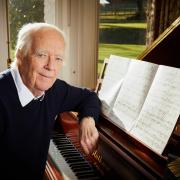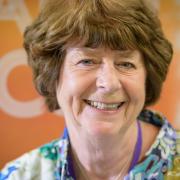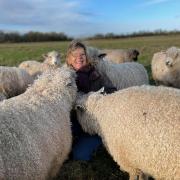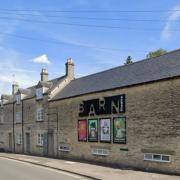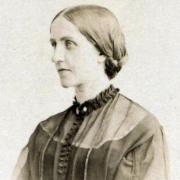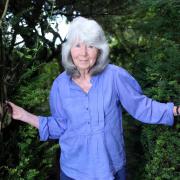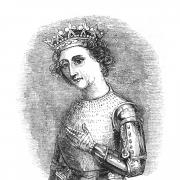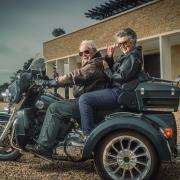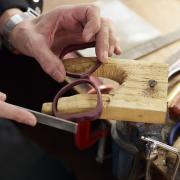The historian and businessman Sir Nicholas Mander and his Swedish wife, Karin, bought Owlpen Manor in 1974 when they were in their early 20s. It was a purchase that not only provided the perfect home for their growing family; it also forged a uniq...
"The terraced gardens with a yew parlour and groups of great clipped yews remained just as they were in the time of Queen Anne... it seemed to me that such an exceptionally beautiful and interesting old house might still be saved." Norman Jewson, writing about Owlpen Manor, Uley, in By Chance I Did Rove
There's a strange and unnatural chill over Owlpen Manor - sudden cold spots that envelope you like a blast from a crypt; frissons of cold, like the icy clutch of an unknown spirit reaching out clawed fingers from an ancient tomb. Perhaps it's the malign influence of the alchemist who is said to continue his mischief still, centuries after his mortal remains were committed to the earth; or the naughty little girl, drowned in the millpond, who runs through the passages and sits on the stairs to the attic. Or even the tragic Queen Margaret of Anjou - occasionally seen at her bedroom window - who spent her last happy night at the manor before riding off to her doom at the Battle of Tewkesbury.
...Or, perhaps, none of the above.
"I'm afraid the central heating isn't working," apologises Sir Nicholas Mander. "We're trying to track down a new pump, but it's not proving easy."
So, instead, we huddle in the kitchen, warmed by its range and the tempting aromas of hot coffee and baking.
Of course, while the sight of any of Owlpen's many and varied unquiet spirits would prove an unsettling experience for mortals, don't go assuming the ghosts have it all easy. The sight of Sir Nicholas and Karin, Lady Mander, relaxing in the kitchen is, undoubtedly, just as upsetting for those on the Other Side. They have their standards, too. "When I was young, the kitchen was a room you weren't allowed into; yet now it's a room we spend our lives in," Sir Nicholas acknowledges, with a wry smile. "Looking back, 50 years later, that does seem an extraordinary way of life."
You can almost hear the ectoplasmic 'tut'.
He has, it is true, seen the demise of a certain kind of world; a semi-feudal world. The life of servants and privilege that Sir Nicholas was born into, in 1950, had begun to sicken and languish around the time of the First World War, and breathed its death rattles in the early '60s.
It was a life where, were the heating to break down, you'd hardly have noticed. As if by magic, firewood would have been chopped and fires lit, without the lady or gentleman of the household having to lift a finger.
"When I was young, we lived in a farm between Stow and Moreton where everyone on the estate had their lives tied up with agriculture; a lot of people had been rooted there for generations; a lot had virtually never left the area except during the war; and even then, typically, they'd been in the veterinary corps or grooms in the cavalry - something to do with animals."
The last vestiges of an age-old, traditional Gloucestershire?
"Yes; I did respond to that line of Laurie Lee about seeing the end of a thousand years of a changeless world. I feel that all my life I've been at the tail end of an era. I remember my aunt saying to me that my parents lived a pre-war way of life."
Yet Sir Nicholas views its passing with the eye of an historian, not as one who bemoans the death of privilege. (In fact, he is a superb historian and the author of a number of authoritative books.)
"In other ways, the lifestyle was quite frugal - nothing was wasted," he says. "The back of every envelope was written on; and my grandmother, who was a very rich woman, would watch as you poured out a glass of water: 'That's enough! You mustn't pour a full glass if you only want to drink half'. It's just how the world was then."
It's a time he has written about eloquently and fascinatingly, such as in a recent article for Country Life magazine: "As soon as you could walk, you were sent hunting, mounted bareback on wild mountain ponies bought from the gypsies at Stow Fair for a fiver. The master of the Heythrop, Capt Ronnie Wallace - known as 'God' - a shrewd school contemporary of my father's, was a genius of a huntsman, pausing to teach us to descry scent maps by the way the mist steamed on the puddles." Sir Nicholas knew Lord Rothermere, who had his own basement cinema at Daylesford, where he would offer his guests vintage cigars; Alan Clutton-Brock, a family friend, the last laird of Jacobean Chastleton, who, (somewhat unusually), was 'at odds with the hunting ethos'; and John Godolphin Bennett at Sherborne who died one morning 'as he demonstrated Gurdjieff's dance movements to his (mostly) American students on the lawn'.
Yet it was Owlpen Manor itself that 'introduced' the Manders to one of the most fascinating of the Cotswolds' characters: the Arts and Crafts architect-designer, Norman Jewson.
**********************
As a young man in his 20s, who had newly purchased Owlpen Manor, Sir Nicholas sat down and penned a letter to Norman Jewson, one of the manor's former owners. Jewson, duly noting the old-fashioned writing, automatically assumed he was corresponding with some crusty septuagenarian. He was far from the only person to make such an erroneous leap of logic. "When we first moved here, I'd get letters addressed to Colonel Mander. Somehow people didn't believe that the person who lived here wasn't a colonel," Sir Nicholas laughs. As it happened, he was a young husband with a growing family, and a wife who was initially reluctant even to look at this ancient manor house.
But as they descended into the remote valley that holds Owlpen like the palm of a hand and saw the delicately-grey Tudor manor for themselves, they were spellbound in exactly the same way so many others had been before them: Gertrude Jekyll, HJ Massingham, Vita Sackville-West, David Verey and Francis Comstock, to name but a few.
The smart London couple, the Pagans, who were selling their 'weekend' retreat were well-heeled, both metaphorically and literally - they probably didn't own a pair of wellington boots between them. "They were very nice people and we got on very well but they had bought the house in the early '60s when there was no real feeling for, or knowledge of, conservation architecture - just a few lone voices in the wilderness.
"They were using cement mixes; they'd put white gloss paint everywhere. The windows were rattling
so they took out the medieval glass; they knocked down outbuildings where you would have kept the saddles and boots and coats and logs... Gone forever."
No wonder Norman Jewson - who still dearly loved the house - breathed a sigh of relief when the Manders' offer was accepted, for they couldn't have been more different. This was a family where spring lambs, born damp in snowdrifts, would be brought into the kitchen to be warmed by the Aga; where children would be the first to run round the passageways in nearly 300 years (if you discount the youngest ghost). For the five Mander offspring are thought to be the first to have been born and raised in the manor house since the early 18th century.
Despite an almost 70-year age gap, the two men became firm friends and, in the last 18 months of his life, Jewson watched as the Manders began the painstaking work of putting Owlpen back together. "He felt we had all the same interests and said how wonderful it was to have someone who appreciated not only Owlpen but all that it stood for, because there was a sense with his generation that Owlpen was a symbol of something; of Englishness, perhaps.
"I was working in London, where I had started a group of tutorial schools, but at the same time we were farming: we had goats and sheep and a 'Good Life' kind of existence, with rare Cotswold sheep and Gloucester cattle. Karin was spinning and weaving and making smocks - I don't know whether we thought the world was going to end!"
"I think we were a little bit hippyish - that's one way of putting it," Lady Mander smiles.
Jewson, at this point, was around 90 years old and in the last 18 months of his life. Brought up in rural Norfolk, long before the first world war, he had known many great luminaries of the Arts and Craft Movement: "I don't know if he'd shaken hands with William Morris but there was certainly an apostolic succession going right back," Sir Nicholas says. "By the time we got to know him, he was slightly misanthropic. As an artist and a craftsman, he was out of sympathy with modernism; the world had 'abandoned' him. I can remember, in particular, reciting with him Raleigh's poem, I wish I loved the human race. Now, of course, everyone thinks he's wonderful and fascinating, but people live through this period very often late in life where their friends have died and they feel everything they've done has been a waste of time."
Jewson thought so much of the Manders that, when he died, he left them sketches, drawings and various pieces of furniture. Walking round this lovely house, his influence and work are clearly discernable, right down to where the craftsmen he employed mended a door - if you examine it, you'll see an obvious, honest repair, not fudged to look old: typical of the Arts and Crafts lack of pretention. Elsewhere, there is Arts and Crafts modelled plasterwork set into the walls - one of the clay strawberry-leaf moulds that he created is on display in a bedroom. And there's furniture, such as a stunning writing bureau in walnut and ebony made in Sapperton in 1913 by Sidney Barnsley who, with his brother Ernest, also worked with Gimson and Jewson. "Sidney Barnsley was said to have made all his own furniture with his own hands, so there's very little of it," Sir Nicholas explains. "The group began with the idea that every workman and labourer should have a simple piece of well-made furniture, but that wasn't sustainable and they ended up making furniture for the rich, instead."
Jewson, like others of his set, was a complicated, fascinating man. "He married, I think it was said, rather beneath him - Ernest Barnsley's daughter - and he treated his daughter, Nancy, like a sort of servant. I went there to have tea with him, not really knowing the set-up. This very nice woman came in with wonderful cups of tea and scones, and he hardly took any notice of her - just sort of dismissed her. I was amazed to find it was his daughter. I think she and his wife didn't share his intellectual interests. But after he died, she became a friend of ours, and I'd go and collect her to spend time with us."
*****************
In spite of its importance, of course, the Arts and Crafts heritage is just one small part of the history that lives on at Owlpen. There are eclectic collections and assorted ephemera that have been imported here - 18th century purses; a man's velvet embroidered costume; an exhibition of manorial charters and deeds from 1220 (the philanthropic and progressive Mander family have been avid collectors over the years). Family portraits abound, alongside interesting photographs - such as Lloyd George staying with Manders of years gone by.
And there are those touches intrinsic to the house itself: graffiti carved into the fireplace by the Daunt boys - Giles, Achilles and Kingscott - who lived here more than 300 years ago: "I have no idea whether or not they would have been severely castigated," Sir Nicholas smiles. And the unique painted cloths, recorded here in 1719 but probably dating from 60 years earlier, which hang in Queen Margaret's Room; Sir Nicholas is currently writing a scholarly book on them. "They're very rare because they're the only complete series of painted cloths to survive in situ. At one time, they were almost universal in the south of England at medieval yeoman level and above - a sort of early wallpaper. They were an interesting part of Elizabethan culture, and Shakespeare himself refers to them several times."
It's this room that the elegant and kindly ghost of Queen Margaret is said to haunt. During the war, Owlpen's then-owner, Barbara Bray, took in evacuees from Birmingham. One night, she found them awake in bed, excitedly discussing their visitor, 'a lovely lady with long sleeves and dress all trimmed with fur, and with a funny peaked hat that had a long veil hanging down behind'. Though the children wouldn't have known it, it's a perfect description of the sort of costume she would have worn.
"I go and speak to the ghosts and tell them to behave," Lady Mander says. "I'm probably mad but that's what I do. Margaret of Anjou is completely benign but there's one who's nasty - an alchemist, possibly a tutor to the boys who once lived here.
"Once, at five in the morning, my son came into my bedroom looking for arnica. When I asked him why, he said it was because his friend had been slapped by the ghost. I shot out of bed to the room where this boy was sleeping, and he was sitting up in bed, white as a sheet, in deep shock. Since then, other people have said they haven't felt comfortable in that room, either.
"We had an exorcism about a year ago. The following morning, I woke up and I have to say I felt the most amazing lightness in the house - I can't describe it. Nicky doesn't believe in ghosts."
"Well," Sir Nicholas counters, "I don't really know what I believe in."
Not ghosts, maybe, but history, yes. And certainly staying true to the spirit of the people who once lived here. "We've always been rather sensitive to the sense of history but also to the fabric and the past lives that have flowed through," he says. "You do ponder the mysteries surrounding the house. You see some indentation in a piece of wood and think, 'Someone's made that; crafted it; whittled it; carved it;' Shakespeare wrote about sermons in stones.
"These are the sorts of things we're trying to hand on to the next generation."
For details of Owlpen Manor, including opening times, the restaurant and the holiday cottages, visit www.owlpen.com
Country Houses of the Cotswolds by Nicholas Mander is published by Aurum Press, price �25.



